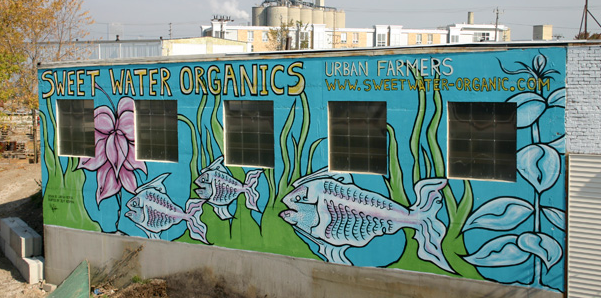What right does Milwaukee have to be at the forefront of aquaponics, an intensive urban agriculture hybrid of hydroponics and fish cultivation? The city doesn't have an especially green reputation. It's certainly not a Boulder, San Francisco, or Twin Cities. It's not even a Madison, which is just ninety miles west on I-94.
Milwaukee isn't supposed to be a place where terms like “sustainability” or “green” are thrown around. It’s supposed to be a blue-collar city with nicknames like “the Cream City” (for its pale bricks made from indigenous clay) or “the Brew City” (for the long history of beer-making). Milwaukee should make big, loud motorcycles and big, loud power tools, right?
Sweet Water Organics, started by Josh Fraundorf and James Godsil, began setting up shop in early 2009 at an old factory that made cranes and mining equipment in its heyday. After the cranes left, a small portion of the space was occupied by flower shops and artist studios. Today that space is filled with a five 10,000 gallon pools of fish, topped by two-tiered vegetable grow-beds.
 The concept of aquaponics is simple and efficient: water rich in nutrients from fish waste is pumped into the beds where a variety of greens, watercress, and herbs filter the water and pull out the valuable nutrients. Sweet Water’s operation spills out of the factory space and into an adjoining lot (donated by a neighboring machine shop), where six more fish runs and three large greenhouses have recently been constructed. Sweet Water’s 54,000 perch and tilapia currently produce over 160 pounds of greens for local restaurants each week. With increased efficiencies, Josh and James believe they’ll eventually raise the weekly production of greens to 400 pounds per week.
The concept of aquaponics is simple and efficient: water rich in nutrients from fish waste is pumped into the beds where a variety of greens, watercress, and herbs filter the water and pull out the valuable nutrients. Sweet Water’s operation spills out of the factory space and into an adjoining lot (donated by a neighboring machine shop), where six more fish runs and three large greenhouses have recently been constructed. Sweet Water’s 54,000 perch and tilapia currently produce over 160 pounds of greens for local restaurants each week. With increased efficiencies, Josh and James believe they’ll eventually raise the weekly production of greens to 400 pounds per week.
Sweet Water is the perfect model of green industry for a no-nonsense city like Milwaukee; at a time when most urban renewal projects focused on food are spearheaded by non-profits and government development funds, Sweet Water Organics is a business that exists to make a profit. Even better, it exists to prove that this kind of business can be profitable.
Sweet Water sells to a growing number of local restaurants, including Honeypie, Coquette Café, and Beans & Barley. It will soon be selling very fresh perch and tilapia (less than two hours out of the water) at its Bay View location as well.
When discussing Milwaukee's emergence as a national leader in aquaponics, a debt must be paid to Will Allen and his work at Growing Power. Since 1998, Growing Power has been operating in Milwaukee (they also have offices in Chicago, run by Will’s daughter Erika Allen), working with kids, improving the community, and providing good, locally produced food in areas often described as “food deserts.” Aquaponics (and vermiculture) has been core to Growing Power’s approach for years. Frauendorf and Godsil, a former board member of Growing Power, originally based their aquaponics system on Allen’s model.
Maybe the growth of aquaculture in Milwaukee shouldn't come as a surprise. With Natural Green Farms, another aquaponics farm opening in another abandoned industrial space in Racine, and the Sweet Water Foundation’s new project -- integrating sustainable housing and retail space with the existing farm -- taking off, it looks like blue-collar Milwaukee is just the right place for a green revitalization.
Public tours are Wednesdays at 6pm and Saturday at noon, call ahead at 414.489.0425.
Matt Friauf is a freelance writer and sustainable food enthusiast based in Milwaukee, WI.




